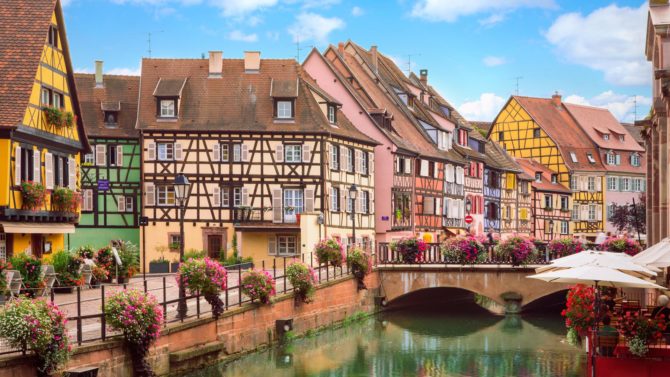The ultimate guide to moving to France
Thinking about relocating to France? French Connections HCB can guide you through the entire process, from helping you to secure your dream home to managing your finances.
It’s easy to see the appeal of living in France – beautiful countryside and coastlines, vibrant cities steeped in culture, not to mention the exquisite food and wine. But before you start getting excited about your new life among the elegant avenues of Paris or the striking backdrop of the French Riviera, there are a few practical considerations you’ll need to take into account.
We spoke to relocation specialist Diana Nyerges from French Connections HCB, who shared her expert advice on relocating to France and how to make sure you’re fully prepared for the big move.
Q: What do I need to consider before moving to France?
A: It’s important that you do your research to make sure that living in France is the right choice for you and to give yourself the best chance of becoming a resident. Here are a few key things to think about:
- Location – consider the lifestyle you want and research a few potential areas that might suit you and your family
- Property – you’ll need to have an address before you move, whether you’re looking to buy a house or rent somewhere first to get a feel for an area
- Insurance – you must have the right type of insurance prior to your arrival
- Finance – make sure you have sufficient financial means to support your move and that you have a good understanding of taxation in France.
Q: Can I still buy property in France after Brexit?
A: Although Brexit has affected your rights to live and work in France, you can still buy property. While 100 per cent mortgages are only available for French tax-paying residents, EU nationals and British citizens can benefit from loan-to-value mortgages of up to 80-85 per cent and non-EU up to 60 per cent.
Q: How does the property market work in France?

A: Buying a property in France is fairly simple but very different to other countries such as the UK and US, with the sale becoming binding much earlier in the process. Property in France is marketed and sold in several ways, including privately, through solicitors and estate agents.
Due to the nature of the early binding contract (acte de vente), you need to give yourself enough time during your viewing trip so you can secure a property before returning home.
When it comes to renting property in France, it can be done in three ways:
- Private rental – this usually requires a three-year contract, deposit, first month’s rent and a secure financial profile
- Estate agents – this includes additional management fees of 10-15 per cent if you can provide proof of French income (if you can’t, 12-month’s rent will be required in advance, along with the completion of a lot of paperwork, taking around two months to finalise via French Connections HCB’s ‘financial profiling to secure rental’ service)
- Long-term holiday rental – this is a contract for 12 months or less and requires one month’s deposit and first month’s rent, as well as some financial references from your home country.
Q: How much does it cost to buy a house in France?
A: Prices displayed by French estate agents or online should include the agent’s fees, which is between four and 10 per cent of the cost of the property (FAI will show next to the price if this is the case). There are no fees payable on private sales. You will also be required to pay lawyer (notaire) fees, which are between six and eight per cent, depending on the property’s value and subject to 20 per cent VAT (TVA).
French property surveys are not usually carried out in the same way they are in the UK and US. You can contact a company or builder to do this before you agree on the sale – if you don’t do this in time, you should ask the notaire to include a ‘clause suspensive’ in the preliminary contract (compromise de vente).
Q: Do I need a visa to live in France?
A: Anyone who wishes to stay in France for more than 90 days consecutively will need to have the right type of visa depending on the purpose of their stay. If you are a secondary homeowner and you just want to enjoy six months in France or if you are planning to settle there for at least a year, you will need the right type of visa to be able to do so.
Q: Do I need a visa or work permit to work in France?
A: Yes. It’s always easier to find a job once you have moved, but you’ll likely have to ‘sacrifice’ your first year to search for a job. If you find a company that is willing to hire you, they should be able to change your visa into a work residency permit.
The other option is to start your search from your home country, find a job and let the company sort out a work permit for you. However, if the company does not have the capacity to do this, then French Connections HCB can help you navigate the process.
In both these cases, however, the company will need to prove that you were the most eligible to be hired in that region. For example, this could include extra language knowledge, qualifications, extensive experience or outstanding publication in that field.
Q: What about when I arrive – is there anything else I will need to do?

A: The first thing you should do when you arrive is get your visa validated with OFII (French Office of Integration and Immigration). You’ll also need to set up a French bank account and get a French phone as you’ll need them for any further admin processes.
Once you are officially living in France and have three months’ worth of utility bills you can start the integration to the French healthcare system. If you came with a car, you’ll need to register it and change your driving licence if it’s non-EU.
Learning French is not mandatory but will be very much appreciated – after all, making an effort to integrate yourself is up to you as a foreigner. If you are later eligible to apply for a 10-year residency or a French passport you will be required to do a language test.
Q: How can French Connections HCB help me with my move?
A: We are a team of French and English bilingual relocation specialists who have lived and worked in many other countries, but are proud to call France home. It’s our love of living here that makes us want to help other people who are looking for a better lifestyle.
Whether you want to give your young family the best start or simply enjoy your retirement in a country where quality of life is a top priority, we are here to help.
If you’re relocating to France and need assistance, contact French Connections HCB on info@frenchconnectionshcb.com or +33 1 85 65 74 98. You can also visit frenchconnectionshcb.com for more information.
Share to: Facebook Twitter LinkedIn Email
More in Complete France, French property buying guides, Personal Finance




